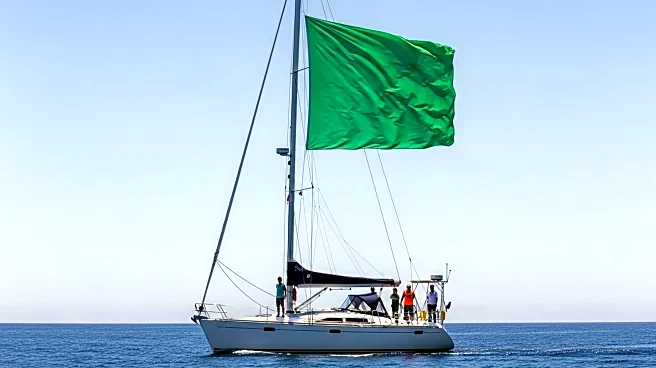What is the story about?
What's Happening?
Greta Thunberg, the Swedish climate activist, has joined the Global Sumud Flotilla in Bizerte, Tunisia, aiming to deliver humanitarian supplies to Gaza and challenge Israel's blockade. The flotilla, consisting of over 40 vessels and approximately 700 activists from 40 countries, has been criticized by Israel as a 'selfie yacht' spectacle. Thunberg expressed her dismay at global leaders' treatment of Palestinians and dismissed the risks of the voyage compared to the daily struggles faced by Palestinians. The flotilla's journey has faced challenges, including suspected drone strikes off Tunisia's coast, which local officials have denied, attributing fires to onboard incidents. Despite setbacks, organizers are determined to proceed, labeling it the largest humanitarian maritime convoy ever.
Why It's Important?
The involvement of Greta Thunberg in the flotilla highlights the intersection of climate activism and geopolitical issues, drawing international attention to the Israeli-Palestinian conflict. The flotilla's mission underscores ongoing debates about humanitarian aid delivery methods to Gaza, with Israel maintaining that its blockade is crucial to prevent weapon smuggling by Hamas. The event could influence public opinion and diplomatic relations, potentially affecting international policies regarding the Israeli blockade and humanitarian efforts in the region. Activists aim to raise awareness and pressure governments to reconsider their stance on the blockade, while Israel emphasizes security concerns.
What's Next?
The flotilla's progress will be closely monitored by international observers and media, with potential diplomatic repercussions depending on its success or failure. Israel's response to the flotilla could involve interception or diplomatic measures, impacting future humanitarian missions to Gaza. Activists may continue to organize similar efforts, seeking alternative routes or methods to deliver aid. The situation may prompt discussions among international bodies regarding the legality and ethics of blockades and humanitarian interventions.
Beyond the Headlines
The flotilla's journey raises broader questions about the role of activism in international conflicts and the effectiveness of such efforts in achieving tangible change. It also highlights the challenges faced by humanitarian missions in politically sensitive regions, where security concerns and political agendas often complicate aid delivery. The event may inspire further activism and advocacy for Palestinian rights, influencing cultural and political discourse globally.
















